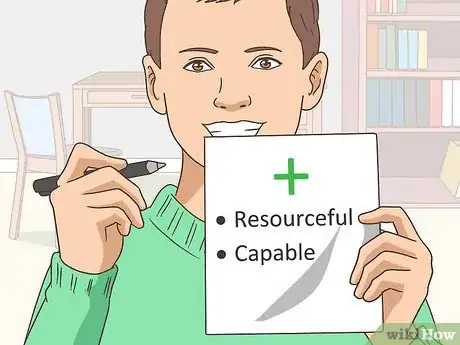This article was co-authored by Julia Lyubchenko, MS, MA and by wikiHow staff writer, Jessica Gibson. Julia Lyubchenko is an Adult Counselor and a Hypnotherapist based in Los Angeles, California. Running a practice called Therapy Under Hypnosis, Julia has over eight years of counseling and therapy experience, specializing in resolving emotional and behavioral problems. She has a Certificate in Clinical Hypnosis from the Bosurgi Method School and is certified in Psychodynamic Psychotherapy and Hypnotherapy. She earned an MA in Counseling Psychology and Marriage and Family Therapy from Alliant International University and an MSc in Developmental and Child Psychology from Moscow State University.
There are 14 references cited in this article, which can be found at the bottom of the page.
wikiHow marks an article as reader-approved once it receives enough positive feedback. In this case, 88% of readers who voted found the article helpful, earning it our reader-approved status.
This article has been viewed 85,955 times.
Have you ever found yourself around someone who can always find the good in things? If you wish you could be a more optimistic person and stay positive when it isn’t easy, realize that there are small steps you can take to make a big change in your thinking. By targeting and reframing the negative thoughts you may have about yourself, you'll create a positive mindset.[1] This positive outlook can improve the way you deal with painful or negative situations.
Steps
Changing Your Mindset
-
1Recite positive affirmations. Every day, remember things that you admire and respect about yourself. Over time, you'll begin feeling positive about yourself because of these self-affirmations, positive statements that help you feel encouraged. Self-affirmations can also make you more compassionate and caring towards yourself, combating any negative thoughts you may have.[2] Examples of positive affirmations include:
- I am capable and equipped to get things done today.
- I have the power to overcome this bad circumstance and turn this around.
- I am a strong and resourceful person, and I can keep going.
-
2Write down your positive traits. Use your positive affirmations to make a list of qualities that you appreciative. Ask yourself what you enjoy about yourself most and write these down.[3] You can also add in skills and accomplishments that you are proud of.[4] For example, you might write down "resourceful," "capable," or "finished my education."
- Use your list to remind yourself of all of your positive qualities. You may want to read them every day so these positive thoughts about yourself really sink in.
Advertisement -
3Do something you love. It's easy to fall into the trap of negative thinking when you don't enjoy what you're doing. Maybe you're overwhelmed by work or your home life. Take some time out of your day to do something that brings you joy. It can be as simple as having a coffee break with a friend or soaking in the tub at the end of the day.
- Studies have shown that doing something that makes you smile can actually help you alleviate pain.[5]
-
4Recognize the importance of confidence and gratitude.[6] Building confidence and self-esteem can be thought of as a form of positive thinking about yourself. Studies have shown that feeling grateful can give you a sense of well-being and increase your own feelings of self-esteem.[7] Gratitude can also promote positive feelings towards others[8] and will help remind you of the good parts of your life.[9]
- Feelings of gratefulness have also been linked to higher levels of empathy, which help you feel more connected to others.[10]
Practicing a Positive Lifestyle
-
1Do mindful meditation. Instead of meditating to clear your mind, focus on being present in the moment and fully aware of your experiences.[11] Find a quiet comfortable place and spend some time focusing on your thoughts.[12] This will sharpen your mentality and make you feel prepared, both of which can help you stay positive.[13] Tell your mind to be still and do nothing other than think from moment to moment.[14]
- Researchers have shown that mindfulness can reduce stress. This improves positive thinking by decreasing anxiety, low mood, and low energy associated with stress.[15]
-
2Practice deep breathing. Begin focusing on your breaths. Notice how you feel emotionally and physically as you inhale and exhale. Make yourself focus on what is going on around you.[16] While taking thoughtful breaths, use your senses to notice what you see, hear, and feel in the room or space.[17] Ask yourself if your body feels tired, relaxed, or stiff. Pay attention to your thoughts and feelings.
- Deep breathing is a good way to revisit what consumed most of your thoughts and influenced your feelings throughout the day.
-
3Do Cognitive Behavioral Therapy (CBT). Consider working with a therapist trained in CBT. This therapy can help you change your current ways of thinking.[18] Since thoughts strongly influence your outlook, begin to change your negative thoughts into positive ones. To do this, you'll need to start noticing your thoughts. Stop yourself when you begin to think a negative thought and reframe it to become positive. For example, if you're stuck waiting for a bus, appreciate the time you have to unwind or have a conversation with someone else waiting for the bus.[19]
- It can be helpful to write down these thoughts in order to help you reframe them. For example, you might write down a negative thought (like disliking driving in the rain) to something positive (like getting more practice driving in the rain).
-
4Write down your goals. Part of being positive is feeling hopeful about the future. Setting goals is a good way to focus on the future. You'll also benefit from a boost in self-esteem when you achieve goals. To improve your chances of successfully meeting goals, make sure the goals are:[20]
- Written down (Studies shows these are more detailed and likely to be met)[21]
- Detailed
- Realistic
- Created with a timeframe or deadline in mind
- Worded positively
-
5Have realistic expectations. While being positive all the time may sound like a great idea, you need to be realistic with yourself. There will be times in your life when you simply won't feel positive. In fact, situations may come up that make you legitimately sad or angry. However, you can use a positive outlook to deal with painful emotions and give yourself a sense of hope or acceptance.
- For example, if you just lost a loved pet, you'll probably feel sad or upset. You can still use positive thinking to remind yourself what you have to appreciate, like the time you had with your pet. Or, you can use positivity to remind yourself that this painful time will pass.
Expert Q&A
Did you know you can get expert answers for this article?
Unlock expert answers by supporting wikiHow
-
QuestionHow do I train myself to be more positive?
 Julia Lyubchenko, MS, MAJulia Lyubchenko is an Adult Counselor and a Hypnotherapist based in Los Angeles, California. Running a practice called Therapy Under Hypnosis, Julia has over eight years of counseling and therapy experience, specializing in resolving emotional and behavioral problems. She has a Certificate in Clinical Hypnosis from the Bosurgi Method School and is certified in Psychodynamic Psychotherapy and Hypnotherapy. She earned an MA in Counseling Psychology and Marriage and Family Therapy from Alliant International University and an MSc in Developmental and Child Psychology from Moscow State University.
Julia Lyubchenko, MS, MAJulia Lyubchenko is an Adult Counselor and a Hypnotherapist based in Los Angeles, California. Running a practice called Therapy Under Hypnosis, Julia has over eight years of counseling and therapy experience, specializing in resolving emotional and behavioral problems. She has a Certificate in Clinical Hypnosis from the Bosurgi Method School and is certified in Psychodynamic Psychotherapy and Hypnotherapy. She earned an MA in Counseling Psychology and Marriage and Family Therapy from Alliant International University and an MSc in Developmental and Child Psychology from Moscow State University.
Adult Counselor & Certified Hypnotherapist Understand that, naturally, the mind is more focused on negative things due to our survival instincts. Try to train your mind to consciously recognize nice things that are happening. This can include noticing nice weather or recognizing when a person was nice to you. You can also try to avoid focusing on things which you cannot control. Every time this happens, make an effort to switch your mind to anything which is within your control.
Understand that, naturally, the mind is more focused on negative things due to our survival instincts. Try to train your mind to consciously recognize nice things that are happening. This can include noticing nice weather or recognizing when a person was nice to you. You can also try to avoid focusing on things which you cannot control. Every time this happens, make an effort to switch your mind to anything which is within your control.
References
- ↑ Julia Lyubchenko, MS, MA. Licensed Therapist. Expert Interview. 29 April 2020.
- ↑ http://self-compassion.org/exercise-2-self-compassion-break/
- ↑ http://ripplerevolution.com/write-a-self-appreciation-journal-30-day-experiment/
- ↑ http://ripplerevolution.com/write-a-self-appreciation-journal-30-day-experiment/
- ↑ http://www.huffingtonpost.com/belle-beth-cooper/10-simple-things-to-be-happy_b_4241824.html
- ↑ Julia Lyubchenko, MS, MA. Licensed Therapist. Expert Interview. 29 April 2020.
- ↑ https://www.psychologytoday.com/blog/what-mentally-strong-people-dont-do/201504/7-scientifically-proven-benefits-gratitude
- ↑ http://greatergood.berkeley.edu/article/item/five_myths_about_gratitude
- ↑ http://il.nami.org/M&G%20Final%2010.11.13.pdf
- ↑ https://www.psychologytoday.com/blog/what-mentally-strong-people-dont-do/201504/7-scientifically-proven-benefits-gratitude
- ↑ https://books.google.com/books?hl=en&lr=&id=QnYBXlX2bPwC&oi=fnd&pg=PR13&dq=mindfulness&ots=ibc7frU0I6&sig=cnlY3gPYRZ1qNO-agI0_Ztu25hA#v=onepage&q=mindfulness&f=false
- ↑ Julia Lyubchenko, MS, MA. Licensed Therapist. Expert Interview. 29 April 2020.
- ↑ http://www.scientificamerican.com/article/mental-downtime/
- ↑ http://selfdeterminationtheory.org/SDT/documents/2003_BrownRyan.pdf
- ↑ http://www.apa.org/monitor/2012/07-08/ce-corner.aspx
- ↑ http://selfdeterminationtheory.org/SDT/documents/2003_BrownRyan.pdf
- ↑ http://selfdeterminationtheory.org/SDT/documents/2003_BrownRyan.pdf
- ↑ http://www.ncbi.nlm.nih.gov/pmc/articles/PMC3584580/
- ↑ Julia Lyubchenko, MS, MA. Licensed Therapist. Expert Interview. 29 April 2020.
- ↑ https://www.psychologytoday.com/blog/notes-self/201308/how-set-goals
- ↑ http://www.forbes.com/sites/85broads/2014/04/08/why-you-should-be-writing-down-your-goals/
About This Article
One way to keep yourself thinking positively throughout the day is by reciting positive affirmations to yourself like “I am capable and equipped to get things done today” or “I am strong and resourceful, and I can keep going.” Over time, these affirmations will help you feel encouraged and better equipped to combat any negative thoughts you might have. With these positive affirmations in mind, write down a list of the things you enjoy most about yourself. Once you have your list, keep it around so you can read it and remind yourself of all your positive qualities whenever you start to feel bad or frustrated. Feel free to include any accomplishments that you’re particularly proud of, like “finished college” or “have a steady job”. For more help from our Mental Health co-author, including how to improve your mood through deep breathing, scroll down!







































































